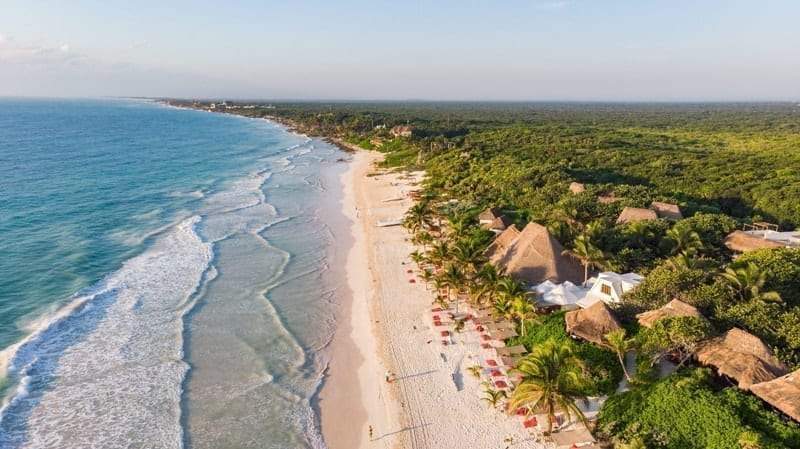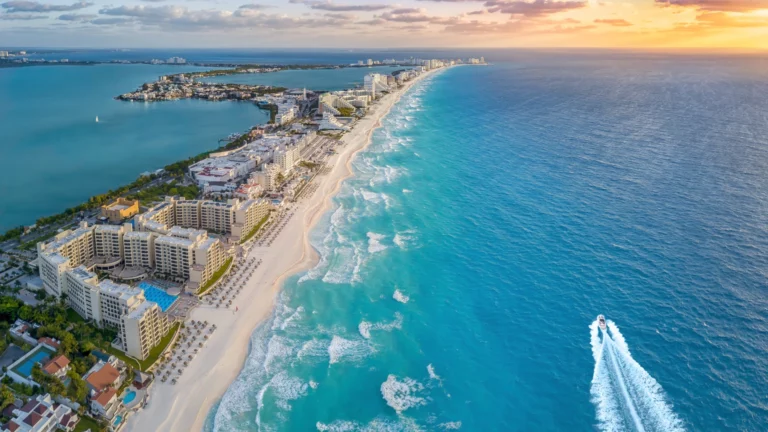Read these Questions and Answers about buying property in Mexico as an American or foreigner
There are many myths, misconceptions, and outright lies surrounding the topic of Mexico real estate ownership for foreigners.
Many articles and blogs written on this subject contain conflicting information and present just one side of a very complex issue.
To make an honest, thoughtful evaluation, you have to be more complete details. In this blog post, I answer some of the common questions about Mexico’s real estate ownership for foreigners.
- 1. What is a Fideicomiso?
- 2. Can I assume someone else’s Trust when I buy a Property in Mexico?
- 3. Can I renew my Fideicomiso when it expires?
- 4. Will my Fideicomiso title be in English?
- 5. How do I begin to create a Trust?
- 6. Why do we need a water bill?
- 7. What happens if the Beneficiary under a trust dies?
- 8. What is a Notary?
- 9. What does the Notary do in a Real Estate transaction?
- 10. Who is the trustee bank?
- 11. How do you select the trustee bank?
- 12. Does it matter which trustee bank I use?
- 13. Is my property an asset of the trustee bank?
- 14. What happens if the trustee bank files bankruptcy?
- 15. How should I title my property?
- 16. Can I title my property in a Mexican Corporation?
- 17. When do I get the title to my new property?
- 18. When do I get possession of my new property?
- 19. How long does the Closing Process take in Mexico?
- 20. What does the “closing date” mean in my contract?
- 21. Who are the parties involved in the purchase?
- 22. Do I need to be present in Mexico at closing?
- 23. What are closing costs in Mexico?
- 24. What is the Public Registry?
- 25. Is my personal information of public record?
- 26. What is an apostille?
- 27. What taxes do I have to pay annually?
- 28. Are any taxes I pay in Mexico deductible in the US?
- 29. What is a factura?
1. What is a Fideicomiso?
If you are a foreigner who wants to purchase property in Mexico, you will need to use a Fideicomiso, commonly called a trust.
The trust gives you the right to use, enjoy, improve, rent, sell, or otherwise enjoy the property. As the beneficiary of the property, you retain all ownership rights and responsibilities to the property and have the right to sell, lease, improve, or will the property to your heirs.
Essentially, you will enjoy all the rights of a fee-simple owner of a piece of real estate.
Click here to learn more about what a Fideicomiso is.
2. Can I assume someone else’s Trust when I buy a Property in Mexico?
Yes, it is possible to do this. The Buyer can take over the Seller’s Trust by assigning his/her Trust to the Buyer during the Closing. The new Trustee must be someone who has the legal capacity to act as a Trustee and must agree to act as such for the new trust.
3. Can I renew my Fideicomiso when it expires?
You can renew your Fideicomisa when it expires. Under Mexican law, you are allowed to automatically extend the 50-year term by an additional 50 years. After the combined 100-year term is up, you will need to apply for a new permit to continue the Fideicomiso.
4. Will my Fideicomiso title be in English?
The Fideicomiso is written in Spanish. But you will receive a certified translation of the Fideicomiso in English for your closing files.
5. How do I begin to create a Trust?
A Notary will draw up the trust and contact Caribe Luxury Homes Real Estate to set it up.
6. Why do we need a water bill?
A water bill helps us determine whether a home was the seller’s primary residence and if the seller will have to pay capital gains taxes on the sale of that home.
7. What happens if the Beneficiary under a trust dies?
Since the creation of the trust, or the appointment of those named as beneficiaries under a trust, the primary beneficiary can appoint a new beneficiary.
In this case, they – and any other named beneficiary – must show to the trustee bank that papers have been filed with a government agency in their home country showing that an estate has been opened and that in their own Will no one else was named as a named beneficiary.
8. What is a Notary?
A notary in Mexico performs many important roles in the community. The notary is certified by the state or federal government to act as an official and unbiased representative of the government of Mexico.
Notaries in Mexico have a far greater responsibility than notaries in the United States. A notary legally ratifies all real estate transactions within Mexico, and thus is responsible for calculating capital gains tax and acts as an impartial witness to any legal document.
Any document not ratified before a notary and duly recorded in the public registry is considered invalid, unenforceable, and fraudulently obtained.
9. What does the Notary do in a Real Estate transaction?
In a real estate transaction, the Notary works equally on behalf of both the Buyer and Seller. However, they are ultimately accountable to the Mexican government.
Their job is to ensure that the transfer of title is legal, to calculate and retain their tax on behalf of the Mexican government, collect the Purchase Tax from the Purchaser and pay it to the Department of Foreign Affairs, coordinate some pre-closing activities (i.e., appraisals, inspections), and make sure all documentation is in place before Closing, as well as record this transaction at the Public Registry and at the Cadastral Office (Tax Office).
For this service, they charge a fee based on the value of the property.
10. Who is the trustee bank?
When creating a trust, a bank must be designated as the trustee. The Mexican bank authorized to act as a trustee is called the fiduciary.
Banks that provide fiduciary services do not necessarily handle all kinds of trusts, but instead, select only those trusts that have specific monetary and estate planning requirements.
11. How do you select the trustee bank?
When deciding on the trustee bank, we’ll typically look for a bank with a local empowered trustee officer to facilitate the closing in a more efficient manner.
As a buyer, you have the right to select any qualified bank as your trustee bank. Caribe Luxury Homes Real Estate currently uses the services of BBVA, Bancomer, Banco Interacciones, ScotiaBank Inverlat, S.A., HSBC and Santander Serfin.
In addition, the services of Deutsche Bank, Bank of America, GE Capital Bank, and Banamex are also leveraged by Caribe Luxury Homes Real Estate.
12. Does it matter which trustee bank I use?
The role of a trustee bank is to act as the trustee of the property held in trust. The trustee’s (bank officer) signature will be required at closing, in any form of litigation, and at the time of sale of the property, etc.
You should look for the location of a trustee bank’s empowered officer — it is important to have the trustee officer located in or near Riviera Maya, and it is also important to use the same trustee bank which currently holds the property in the trust. This occurs most often in the private resale of the property.
13. Is my property an asset of the trustee bank?
No. Trust-owned property and Fideicomiso are not assets of the trustee bank. The property is transferred to another trustee bank in the rare case that the bank goes into financial difficulty. These federal laws exist to ensure the financial security of beneficiaries and trust owners.
14. What happens if the trustee bank files bankruptcy?
The trustee bank for a trust that includes property in the restricted zone is not responsible for the trust if it files bankruptcy. A new trustee bank will take over the trust and its properties.
15. How should I title my property?
You can title the property in any way that you could title an asset in the United States, such as in an individual name(s) (either via joint tenancy or tenants-in-common), an individual or family trust, an LLC or other US corporation or partnership, and so on.
This is a matter better determined by your US legal or tax advisor, as tax and legal consequences in Mexico are the same for a foreigner in Mexico regardless of how the property is titled.
16. Can I title my property in a Mexican Corporation?
If you own a business in Mexico, it is possible to title the property of that business in a Mexican corporation. However, for residential purposes, it is illegal for foreigners to own property in this manner.
We suggest that you discuss this option with your United States and Mexican legal counsel and financial advisors prior to making this determination.
17. When do I get the title to my new property?
After you sign the deed and other closing documents, we’ll submit these to a notary who will record the property’s new ownership in a public registry.
After this is done, the notary will prepare a statement showing that the title is yours. The statement will be sent to the title company so that they can begin preparing your final closing documents.
It can take up to three months for this process to finish.
18. When do I get possession of my new property?
Assuming everything goes smoothly, you will get possession of your new home when the title is transferred and escrow releases any remaining funds to you or your lender.
19. How long does the Closing Process take in Mexico?
Closing a real estate transaction in Mexico can be time-consuming and complicated. In most cases, it takes 60 working days for a cash transaction or 90 working days for a transaction involving financing.
Delays can happen due to Mexican holidays or permit delays, and the Trustee Bank can hold up the process.
20. What does the “closing date” mean in my contract?
By “closing date,” the Seller means the date on which the sale of the property is finalized, and the Buyer becomes the rightful owner. The closing date is the target for the signing of legal documents, which occur at the Notary Public.
While there are many factors that can cause a delay in closing, including government offices, bank trustees, Mexican holidays, and permit delays, our team works hard to close your transaction as quickly as possible.
21. Who are the parties involved in the purchase?
The parties involved in the Mexican real estate transaction are the buyer and seller, their agents and legal counsels, the closing officer, and if financing is involved, the lender, loan officer and appraiser.
22. Do I need to be present in Mexico at closing?
No. In most transactions, the Notary will prepare a simple bank letter with a specific power of attorney for you to sign remotely. This letter will advise the trust company of your intentions regarding the purchase and sale of the property, and it will direct the trust company to act on your behalf. At closing, this letter will be attached to the Fideicomiso in lieu of your signature.
23. What are closing costs in Mexico?
Closing costs in Mexico are lower than in the US. The largest portion is the Acquisition Tax of 2% paid by the Buyer for all real estate acquisitions. Other costs include permits, Notary fees, certificates or no debt, appraisal, etc.
Depending on the purchase price, closing costs are typically between 3.5% to 6% of the purchase price. All closing costs will be deducted from your profit when you sell your property.
Click here to learn about who pays closing cost in Mexico.
24. What is the Public Registry?
The local public registry (Registro Publico) is the office that maintains the record of ownership of all properties held in the municipality. A contract is not considered to be formally validated until such time as it has been registered with this office.
25. Is my personal information of public record?
Only the owner’s name(s) are public record. All personal information, including date of birth, social security number and address is kept confidential by the Notary and Trustee Bank.
26. What is an apostille?
The apostille process ensures that public documents issued in one signatory country will be recognized as valid in another signatory country.
27. What taxes do I have to pay annually?
There are no annual taxes in Riviera Maya. However, there are property taxes (Impuestos Prediales). These municipal taxes must be paid at the local tax office and in municipality offices.
If payment is made by the end of February, you may eligible to benefit from a 10% discount.
28. Are any taxes I pay in Mexico deductible in the US?
According to the North American Free Trade Agreement, capital gains tax (a federal tax) paid by the seller can be credited in the United States.
Any other taxes or fees deductible in the United States should be discussed with your US financial advisors.
29. What is a factura?
In Mexico, the term “factura” refers to an official, tax-deductible invoice issued by a Mexican company or individual. The factura is a customized printed invoice, identifiable by the red factura number in the upper right hand corner and the imprint of the payee’s tax ID number and seal (Cedula) in the bottom left corner.
In Mexico, the receipt of a factura requires that you pay the additional 10% IVA over the value of any business service or product.








